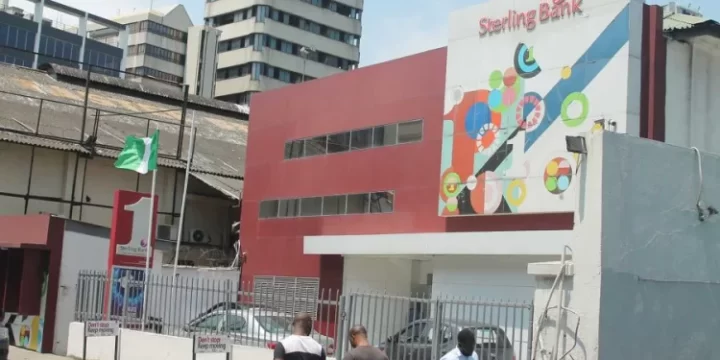Sterling Bank Plc has reiterated its commitment to advancing food security across Africa through strategic investments, partnerships, and innovative financing models aimed at boosting agricultural productivity and sustainability. The bank emphasized that transforming the continent’s agricultural landscape is central to achieving economic growth, reducing poverty, and ensuring long-term stability.
Speaking at a recent agribusiness summit in Lagos, the Managing Director and Chief Executive Officer of Sterling Bank, Abubakar Suleiman, said the institution remains steadfast in supporting agribusinesses across the value chain — from production and processing to distribution and export. He highlighted agriculture as one of the bank’s key focus sectors under its HEART strategy, which prioritizes Health, Education, Agriculture, Renewable Energy, and Transportation as critical drivers of development in Africa.

Suleiman noted that Africa’s food security challenge can only be addressed through a combination of innovative financing, technology adoption, and strong collaboration between public and private sectors. “Sterling Bank is committed to creating an enabling environment for farmers, agripreneurs, and investors to thrive. We are not just funding agriculture; we are building ecosystems that ensure sustainable food production and distribution,” he said.
He explained that the bank’s investments are designed to address key barriers facing the sector, including inadequate access to credit, poor infrastructure, limited mechanization, and post-harvest losses. According to him, the bank’s agricultural financing framework supports farmers through tailored loan products, risk management tools, and capacity development initiatives.
In recent years, Sterling Bank has launched several programs aimed at empowering smallholder farmers and agribusinesses. These include partnerships with international organizations, government agencies, and technology firms to enhance productivity and market access. The bank has also developed digital platforms that simplify access to credit and enable transparent monitoring of agricultural projects.
Suleiman noted that Sterling Bank’s efforts go beyond conventional banking by focusing on sustainability and value addition. “We are working with partners to improve local processing capacity, reduce dependency on imports, and strengthen value chains for staple crops such as rice, maize, cassava, and soybeans. Our goal is to make agriculture not just viable, but truly profitable for African farmers,” he added.
The bank’s focus on agriculture has already yielded significant impact, with thousands of farmers benefiting from its intervention programs. One of the flagship initiatives, the Sterling Agriculture Finance and Development Programme (SAFDEP), provides affordable financing to farmers, cooperatives, and agritech startups while promoting the use of climate-smart agricultural practices.
Industry analysts have commended Sterling Bank’s consistent engagement in the agriculture sector, noting that its model demonstrates how financial institutions can drive inclusive growth through targeted interventions. By leveraging partnerships with development agencies and private investors, the bank has created scalable solutions that improve productivity and reduce risks associated with agricultural financing.
A recent report by the Food and Agriculture Organization (FAO) underscores the urgency of addressing Africa’s food insecurity, noting that over 280 million people on the continent face hunger. Nigeria, Africa’s most populous country, remains particularly vulnerable due to climate change, inadequate infrastructure, and high post-harvest losses. Sterling Bank’s approach, which combines financing with capacity-building and technology integration, is seen as a practical model for tackling these challenges.
At the summit, stakeholders discussed how sustainable financing models can transform agriculture into a major engine of growth for African economies. Representatives from the African Development Bank (AfDB) and the International Fund for Agricultural Development (IFAD) praised Sterling Bank for aligning its strategy with continental goals such as the African Union’s Agenda 2063 and the Comprehensive Africa Agriculture Development Programme (CAADP).
The bank also revealed plans to expand its agricultural footprint beyond Nigeria, focusing on cross-border partnerships that can boost food production and trade across West and Central Africa. Suleiman said this expansion would be anchored on digital solutions that improve supply chain visibility, enhance logistics, and connect smallholders directly with regional markets.
He emphasized that the future of Africa’s food system depends on innovation and collaboration. “Food security is not just about producing enough food; it’s about building resilient systems that can withstand economic shocks and climate risks. Our goal is to work with governments, investors, and development partners to create lasting impact,” he said.
Sterling Bank’s agricultural agenda also aligns with the Nigerian government’s efforts to diversify the economy and reduce dependence on oil revenue. By promoting investments in food production, processing, and export, the bank is helping to build a more resilient economic structure that empowers rural communities and enhances national productivity.
In addition to financing, the bank is investing in knowledge-sharing platforms and research partnerships aimed at equipping farmers with modern farming techniques and market intelligence. Through its collaboration with agritech firms, Sterling Bank has also introduced precision farming solutions that use data and analytics to optimize yields and resource efficiency.
As food security remains a top priority across the continent, Sterling Bank’s continued leadership in agricultural development positions it as a key player in shaping Africa’s sustainable future. By combining finance, innovation, and social impact, the bank is helping to lay the foundation for a food-secure Africa — one where farmers, agribusinesses, and communities can thrive together in a more inclusive and resilient economy.
Support InfoStride News' Credible Journalism: Only credible journalism can guarantee a fair, accountable and transparent society, including democracy and government. It involves a lot of efforts and money. We need your support. Click here to Donate
